Top 10 Foods Highest in Vitamin K
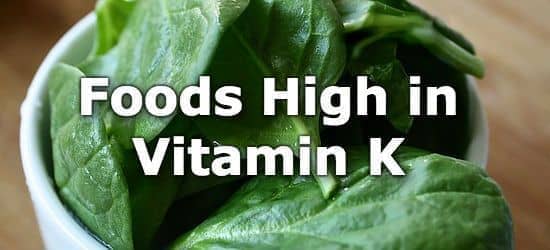
Vitamin K is an essential vitamin required for protein modification and blood clotting. (1)
Recent studies suggest that vitamin K may play a role in treating osteoporosis and Alzheimer's. (2,3) and that consuming increased levels of vitamin K can help protect against cancer and heart disease. (4,5)
Unless you are taking medication to prevent blood clots, like Warfarin or Coumadin, there is no known risk of vitamin K toxicity, and no reason not to eat a lot of it. If you are on Warfarin (Coumadin), please check the article on low vitamin K foods for a Warfarin diet.
Foods high in vitamin K include leafy green vegetables (cooked and raw), broccoli, Brussels sprouts, cabbage, pickled cucumber, asparagus, kiwifruit, okra, green beans, and salad greens like lettuce. The current daily value (DV) for Vitamin K is 120 micrograms (mcg). (6,7)
Below is a list of foods high in vitamin K sorted by a common serving size. For more, see the extended list of less common foods rich in vitamin K, or view, sort, and filter vitamin K foods using the nutrient ranking tool which lists over 200 foods high in vitamin K.
Foods High in Vitamin K
-
1. Kale + Add
Vitamin K
per Cup CookedVitamin K
per 100gVitamin K
per 200 Calories544mcg
(453% DV)419mcg
(349% DV)2325mcg
(1938% DV)More Leafy Greens High in Vitamin K
- 740% DV in 1 cup of cooked spinach
- 644% DV in 1 cup of cooked collards
- 581% DV in 1 cup of cooked beet greens
- 441% DV in 1 cup of cooked turnip greens
Note: Cooking only concentrates the vitamin K in these greens. The raw uncooked forms are also high in vitamin K.
See all vegetables high in vitamin K.
-
 2. Broccoli + Add
2. Broccoli + Add
Vitamin K
per Cup CookedVitamin K
per 100gVitamin K
per 200 Calories220mcg
(183% DV)141mcg
(118% DV)806mcg
(672% DV)See all vegetables high in vitamin K. -
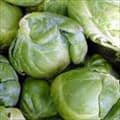 3. Brussels Sprouts + Add
3. Brussels Sprouts + Add
Vitamin K
per Cup CookedVitamin K
per 100gVitamin K
per 200 Calories219mcg
(182% DV)140mcg
(117% DV)779mcg
(650% DV) -
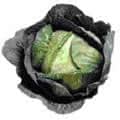 4. Cabbage + Add
4. Cabbage + Add
Vitamin K
per Cup CookedVitamin K
per 100gVitamin K
per 200 Calories163mcg
(136% DV)109mcg
(91% DV)945mcg
(788% DV)Pak-Choi (Bok Choy) provides 48% DV of vitamin K per cup cooked.See all vegetables high in vitamin K.
-
 5. Pickled Cucumber + Add
5. Pickled Cucumber + Add
Vitamin K
per CupVitamin K
per 100gVitamin K
per 200 Calories130mcg
(109% DV)77mcg
(64% DV)126mcg
(105% DV)- 55% DV in 1 cup of kimchi
- 15% DV in 1 cup of sauerkraut
-
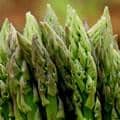 6. Asparagus + Add
6. Asparagus + Add
Vitamin K
per Cup CookedVitamin K
per 100gVitamin K
per 200 Calories91mcg
(76% DV)51mcg
(42% DV)460mcg
(383% DV) -
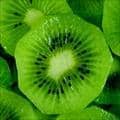 7. Kiwifruit + Add
7. Kiwifruit + Add
Vitamin K
per CupVitamin K
per 100gVitamin K
per 200 Calories73mcg
(60% DV)40mcg
(34% DV)132mcg
(110% DV)More Fruits High in Vitamin K
- 35% DV in 1 avocado
- 24% DV in 1 cup of blueberries
- 24% DV in 1 cup of blackberries
See all fruits high in vitamin K.
-
 8. Okra + Add
8. Okra + Add
Vitamin K
per Cup CookedVitamin K
per 100gVitamin K
per 200 Calories64mcg
(53% DV)40mcg
(33% DV)364mcg
(303% DV) -
9. Green (Snap) Beans + Add
Vitamin K
per Cup CookedVitamin K
per 100gVitamin K
per 200 Calories60mcg
(50% DV)48mcg
(40% DV)274mcg
(228% DV) -
 10. Lettuce + Add
10. Lettuce + Add
Vitamin K
per CupVitamin K
per 100gVitamin K
per 200 Calories56mcg
(47% DV)102mcg
(85% DV)1574mcg
(1312% DV)Other Salad Greens High in Vitamin K
- 820% DV in 1 cup of parsley
- 431% DV in 1 cup of garden cress
- 96% DV in 1 cup of endive
- 85% DV in 1 cup of radicchio
- 72% DV in 1 cup of chicory greens
- 71% DV in 1 cup of watercress
See all vegetables high in vitamin K.
Printable One Page Sheet
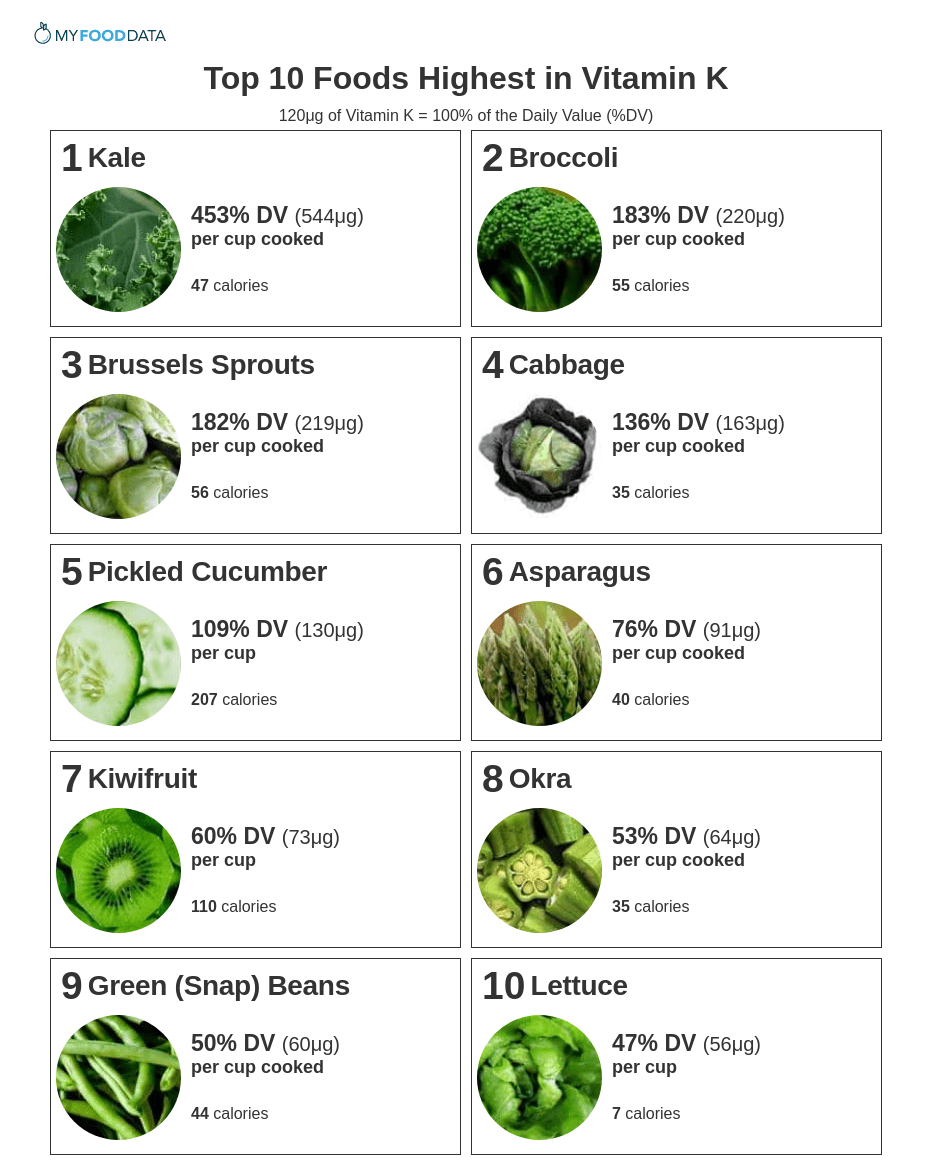
Less Common Foods Rich in Vitamin K
| Food | Serving | Vitamin K |
|---|---|---|
| 1. Dandelion Greens + | per cup cooked | 482% DV (579mcg) |
| 2. Pesto + | per 1/4 cup | 79% DV (95mcg) |
| 3. Jute Potherb (Molokhiya) + | per cup cooked | 78% DV (94mcg) |
| 4. Broccoli Raab (Rapini) + | per cup raw | 75% DV (90mcg) |
| 5. Chinese Broccoli (Gai Lan) + | per cup cooked | 62% DV (75mcg) |
| 6. Soybean Sprouts + | per cup cooked | 55% DV (66mcg) |
| 7. Kimchi + | per cup | 55% DV (65mcg) |
| 8. Celeriac + | per cup | 53% DV (64mcg) |
| 9. Fennel + | per cup | 46% DV (55mcg) |
| 10. Edamame (Green Soybeans) + | per cup | 34% DV (41mcg) |
| 11. Natto (Fermented Soybeans) + | per cup | 34% DV (40mcg) |
About Vitamin K2
Vitamin K1, known as Phylloquinone, occurs in green leafy vegetables listed above. Phylloquinone is converted by gut bacteria in the body into menaquinones (MK-n) known as vitamin K2. (8,9)
Since other animals also create vitamin K2 from K1, vitamin K2 is found in animal food products listed below.
Vitamin K2 recently showed neuroprotective effects, (10) arthritis protection, (11) and prevention of bone loss. (12) All studies are very recent and mostly in mouse models, so much more research is needed to substantiate these claims.
Foods high in vitamin K2 are also high in cholesterol, but may be part of a healthy diet, or work for people on a meat-based diet. However, for those eating plenty for vitamin K1 from the vegetables listed above, it is not necessary to obtain vitamin K2 from the foods listed below.
Foods High in Vitamin K2 (Menaquinone-4)
| Food | Serving | Vitamin K |
|---|---|---|
| 1 Pepperoni (Beef and Pork) | 3oz | 30% DV (35mcg) |
| 2 Chicken Hotdog | 3oz | 18% DV (21mcg) |
| 3 Kielbasa Sausage | 3oz | 14% DV (17mcg) |
| 4 Whole Milk | 16oz glass | 4% DV (5mcg) |
| 5 American Cheese | 1oz | 3% DV (4mcg) |
| 6 Cured Ham | 3oz | 3% DV (4mcg) |
| 7 Pulled Pork in BBQ Sauce | per cup | 3% DV (4mcg) |
| 8 Salami | 1/2 oz | 3% DV (3mcg) |
| 9 Neufchatel Cheese | 1oz | 2% DV (3mcg) |
| 10 Cheddar Cheese | 1oz | 2% DV (2mcg) |
| 11 Wild Eastern Oysters | 6 medium (~1.5oz) | 2% DV (2mcg) |
| 12 Grated Parmesan | 1oz | 2% DV (2mcg) |
How Much Vitamin K Do You Need Everyday?
The daily value (%DV) for Vitamin K is 120 micrograms (mcg) and is a general target intended for most people. The Adequate Intake (AI) shows specific targets by age and gender. The AI for Vitamin K is between 90mcg - 120mcg for most people. (7)
| Life Stage | AI |
|---|---|
| Infants | |
| 0-6 months old | 2mcg |
| 7-12 months old | 2.5mcg |
| Children | |
| 1-3 years old | 30mcg |
| 4-8 years old | 50mcg |
| Males | |
| 9-13 years old | 60mcg |
| 14-18 years old | 75mcg |
| 19-70+ years old | 120mcg |
| Females | |
| 9-13 years old | 60mcg |
| 14-18 years old | 75mcg |
| 19-70+ years old | 90mcg |
| Pregnancy | |
| 14-18 years old | 75mcg |
| 19-50 years old | 90mcg |
| Lactation | |
| 14-18 years old | 75mcg |
| 19-50 years old | 90mcg |
Health Benefits of Vitamin K
- Bone Health and Osteoporosis - Vitamin K is necessary for creation of the protein: S. Osteocalcin, which in turn synthesizes osteoblasts: bone forming cells. In short, vitamin K is necessary for the strength and maintenance of bones. (13) In addition to vitamin K, vitamin D and calcium are also essential for strong bones. (13)
- Reduced Alzheimer's Risk and Better Brain Health - Low levels of vitamin K are associated with a high incidence of Alzheimer's disease. (14) While further studies are needed, vitamin K shows promise for neuroprotective effects and reduce risk of disease of the brain as we age. (2,10,15)
Vitamin K Guidelines for Warfarin (Coumadin)
- A low INR means you have an increased risk of clotting
- A high INR means you have an increased risk of bleeding
- Warfarin increases INR, Vitamin K decreases it
- Most doctors aim to keep INR around 2-3, but it can go up to 2.5-3.5 for people with heart valve issues or other extreme cases (16)
- When a doctor prescribes Warfarin, they are trying to balance it with how much vitamin K you eat (17)
- Regularly check your PT/INR levels
- Take the same amount of Warfarin at the same time each day
- Keep your intake of vitamin K consistent from day to day
- Eliminate alcohol if you can, or limit yourself to no more than 3 drinks a day (18)
- Take no more than 800IU of vitamin E supplements
- Avoid cranberries and cranberry juice as they can raise INR and risk of bleeding (19)
- Limit or avoid grapefruit and grapefruit juice
- Avoid drinking green tea as it antagonizes Warfarin and lowers INR (20)
- Work with your doctor when taking CoQ10 as it can hamper the effectiveness of Warfarin (21)
- Avoid Tobacco (22)
- Many natural herbs, roots, berries, and supplements affect PT/INR levels, so it is best to avoid them unless your doctor advises otherwise. The following supplements, and potentially many more, affect PT/INR levels: (22)
- Arnica
- Bilberry
- Butcher's Broom
- Cat's Claw
- Chamomile Tea
- Chitosan
- Dong Quai
- Feverfew
- Forskolin
- Garlic
- Ginger
- Gingko
- Goji Berries
- Horse Chestnut
- Insositol Hexaphosphate
- Licorice
- Melilot (Sweet Clover)
- Pau D'arco
- Red Clover
- St. John's Wort
- Sweet Woodruff
- Turmeric
- Willow Bark
- Wheat Grass
- Wolfberry
- Use the Nutrient Ranking Tool to find foods low in vitamin K, and see the article on low vitamin K foods. Want to check on just one food? Try the nutrition facts tool.
From the Nutrient Ranking Tool
Use the ranking tool links below to select foods and create your own food list to share or print.
- Foods High in Vitamin K
- Foods Low in Vitamin K
- Vegetables High in Vitamin K
- Fruits High in Vitamin K
- Vegetarian Foods High in Vitamin K
- Beans High in Vitamin K
- Dairy High in Vitamin K
- Breakfast Cereals High in Vitamin K
- Fast Foods High in Vitamin K
View more nutrients with the nutrient ranking tool, or see ratios with the nutrient ratio tool.
Related
Data Sources and References
- Hathaway WE. Vitamin K and thrombosis Southeast Asian J Trop Med Public Health. 1993;24 Suppl 1:5-9. 7886607
- Kusano J, Tanaka S, Matsuda H, Hara Y, Fujii Y, Suzuki S, Sekiyama M, Ando E, Sugiyama K, Hirano T. Vitamin K2 Holds Promise for Alzheimer's Prevention and Treatment J Clin Pharm Ther. 2018 Dec;43(6):895-902. doi: 10.1111/jcpt.12747. Epub 2018 Jul 16. 30014604
- Hamidi MS, Gajic-Veljanoski O, Cheung AM. Vitamin K and osteoporosis: Myth or reality? J Clin Densitom. 2013 Oct-Dec;16(4):409-13. doi: 10.1016/j.jocd.2013.08.017. Epub 2013 Oct 3. 24090644
- Halder M, Petsophonsakul P, Akbulut AC, Pavlic A, Bohan F, Anderson E, Maresz K, Kramann R, Schurgers L. New insights into vitamin K biology with relevance to cancer Int J Mol Sci. 2019 Feb 19;20(4):896. doi: 10.3390/ijms20040896. 30791399
- Vlasschaert C, Goss CJ, Pilkey NG, McKeown S, Holden RM. Vitamin K2-a neglected player in cardiovascular health: a narrative review Nutrients. 2020 Sep 23;12(10):2909. doi: 10.3390/nu12102909. 32977548
- U.S.FDA - Daily Value on the New Nutrition and Supplement Facts Labels
- Institute of Medicine (US) Panel on Dietary Antioxidants and Related Compounds. Dietary Reference Intakes for Vitamin A, Vitamin K, Arsenic, Boron, Chromium, Copper, Iodine, Iron, Manganese, Molybdenum, Nickel, Silicon, Vanadium, and Zinc Washington (DC): National Academies Press (US); 2000. 25077263
- Tsugawa N, Okano T. [Vitamin K metabolism. Menaquinone-4 (MK-4) formation from ingested VK analogues and its potent relation to bone function] Clin Calcium. 2007 Nov;17(11):1717-26. 17982192
- Crivello NA, Casseus SL, Peterson JW, Smith DE, Booth SL. Age and dietary form of vitamin K affect menaquinone-4 concentrations in male Fischer 344 rats J Nutr Biochem. 2010 Nov;21(11):1083-8. doi: 10.1016/j.jnutbio.2009.09.005. Epub 2010 Jan 25. 20092997
- Godinho J, de Sa-Nakanishi AB, Moreira LS, de Oliveira RMW, Huzita CH, Mello JCP, da Silva AOF, Nakamura CV, Previdelli IS, Ribeiro MHDM, Milani H. Neuroprotective effect of menaquinone-4 (MK-4) on transient global cerebral ischemia/reperfusion injury in rat J Ethnopharmacol. 2018 Jul 15;221:109-118. doi: 10.1016/j.jep.2018.04.018. Epub 2018 Apr 13. 29660468
- Okamoto H. Anti-arthritis effects of vitamin K(2) (menaquinone-4)--a new potential therapeutic strategy for rheumatoid arthritis IUBMB Life. 2008 Jun;60(6):355-61. doi: 10.1002/iub.41. 18484089
- Smith BJ, Bu SY, Wang Y, Rendina E, Lim YF, Marlow D, Clarke SL, Cullen DM, Lucas EA. Menaquinone 4 Reduces Bone Loss in Ovariectomized Mice through Dual Regulation of Bone Remodeling Bone. 2014 Jan;58:151-9. doi: 10.1016/j.bone.2013.10.005. Epub 2013 Oct 11. 24125756
- Murray TM. Importance of calcium, vitamin D and vitamin K for osteoporosis prevention and treatment CMAJ. 1996 Oct 1;155(7):935-9. 8837543
- Shatenstein B, Kergoat MJ, Reid I. Low vitamin K intakes in community-dwelling elders at an early stage of Alzheimer's disease J Am Diet Assoc. 2007 Dec;107(12):2091-9. doi: 10.1016/j.jada.2007.09.008. 18060894
- Ferland G. Vitamin K, an emerging nutrient in brain function Semin Thromb Hemost. 2013 Nov;39(8):849-55. doi: 10.1055/s-0033-1357481. Epub 2013 Oct 9. 24108469
- Agarwal S, Bennett D, Smith DJ. Consensus guidelines for warfarin therapy. Recommendations from the Australasian Society of Thrombosis and Haemostasis Am J Cardiovasc Drugs. 2010;10(1):37-48. doi: 10.2165/11318870-000000000-00000. 20104933
- Olsson SB, Halperin JL. Dietary implications for patients receiving long-term oral anticoagulation therapy for treatment and prevention of thromboembolic disease Semin Vasc Med. 2005 Aug;5(3):285-92. doi: 10.1055/s-2005-916168. 16123916
- Parrish RH, Pazdur DE, O'donnell PJ. Enhanced antithrombotic effect of warfarin associated with low-dose alcohol consumption Pharmacotherapy. 2006 Nov;26(11):1650-3. doi: 10.1592/phco.26.11.1650. 17064211
- Paeng CH, Sprague M, Jackevicius CA. Warfarin-cranberry juice interaction resulting in profound hypoprothrombinemia and bleeding Clin Ther. 2007 Aug;29(8):1730-5. doi: 10.1016/j.clinthera.2007.08.018. 17919554
- Hidalgo K, Lyles A, Dean SR. Probable antagonism of warfarin by green tea Ann Pharmacother. 2011 Jan;45(1):e3. doi: 10.1345/aph.1P491. Epub 2010 Dec 28. 21189363
- Goll J. [Interaction between warfarin and coenzyme Q10] Ugeskr Laeger. 1998 Aug 17;160(34):4916. 9741268
- Asher GN, Corbett AH, Hawke RL. Warfarin and food, herbal or dietary supplement interactions: A systematic review Am Fam Physician. 2017 Jul 15;96(2):101-107. 28762712
- ODS Fact Sheet on Coumadin (Legacy file hosted on MyFoodData.com)
Simplify Nutrition Tracking with MyFoodData!
Speedy Tools and Detailed Data FREEEasily analyze your meals to find the best foods for your goals.
✅ Use our recipe nutrition calculator and nutrition comparison tool.
✅ Access expert nutrition data tools and in-depth articles.
✅ Log foods and organize your recipes with a free account.


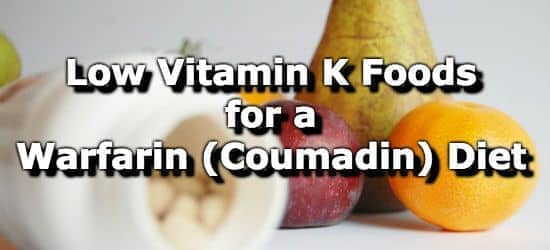 Next ➞
Next ➞
